- Home
- Jessie Haas
Chase Page 7
Chase Read online
Page 7
The door stuck, but a gentle shove with his shoulder pushed it open. Dead leaves were deep in the corners of the first room. Rodents rustled. In the next room a table stood near the leaf-filled fireplace, bare except for mouse droppings. The stairs were broken. There seemed no reason to go up.
He stepped outside, away from the mousy smell. The sun had set. No time to look for food, but he could gather some firewood—
Down in the trees a horse snorted.
Phin was behind the house before he knew he’d started running. Past the barn, past the spring; he plunged into the sheltering woods and looked back.
A horse and rider came out into the open. Phin didn’t need to see a face. It was Fraser, his hat, his long dark coat, his stallion, coming at a swift walk, head low, snatching bites of grass while Phin stood paralyzed with shock, unable to think, barely able to breathe.
Fraser let the horse eat a moment while he scanned the field, the old house, the fallen barn.
Then he did an odd thing. Drawing the horse’s head up, he reached forward and took hold of the bridle by the cheek strap. A moment later the bit dropped out, and swung like a cowbell at the stallion’s throat.
Fraser reached back into his saddlebags and took something out. Phin caught a glimpse of gray cloth. Man and horse considered it. Then Fraser put it back in the saddlebag and let the reins go slack.
The stallion gazed uphill, wild head turning as he seemed to search the edge of the woods. When he stopped moving, he was pointing directly at Phin.
Fraser nodded. He picked up the reins and lifted the stallion into a canter, straight up the meadow.
Released from his trance, Phin fled, twisting between trees, ripping through brambles.
An immense crack and rustle behind; the horse had entered the wood. Phin heard a loud snap, a curse from Fraser, and looked wildly over his shoulder. Fraser was drawing rein, coming on at a trot with one arm flung up to protect his face.
“Wait!” he called.
Phin ducked behind a big tree. The stallion charged past, overshooting. Fraser wrenched him around, making up ground with terrifying speed. Phin could see the sweat on Fraser’s face. A gloved hand reached. Phin swerved like a weasel. Fraser missed and was carried far past, swearing.
The saplings ahead grew close as the teeth of a comb. Phin shoved through them, and the ground dropped out from under him. He plunged down a slope thick with brown pine needles—somersaulting, hitting rocks and tree trunks so fast, so nearly airborne, that nothing really hurt. Faster and faster, till the ground flattened out and he rolled to a stop.
He lifted his head. Everything spun, and slowly settled. He lay beside a small stream. Pines soared above him. It was almost dark under their green-black roof, as if he’d fallen into another world.
The real world was close, though. Above him he heard hoofbeats. He dragged himself to his feet and ran downstream.
Scrambling sounds came from behind; the stallion must be sliding down the pine slope. Phin tried to look over his shoulder and something hard caught him on the shins. He fell sprawling on an immense rock that lay across the stream. Pushing himself up, he saw wheel ruts on either side. A bridge, low and crude.
Hooves drummed. Phin scrambled off the rock and threw himself full length into the stream.
The water came halfway up his ribs, shockingly cold, but yes, there was space under the great stone. He squirmed in, icy water pooling in the small of his back. There was an old cold smell of dirt and worms.
Was he all the way in? He tried to look back, but couldn’t raise or turn his head. He wiggled deeper, till his head was near the other side, clenching his teeth to stop their chattering.
A stone in the streambed dug painfully into his hip. He tried to reach down and move it, and as his elbow struck the rock above, he realized that it wasn’t a stone at all. It was his wooden matchbox, soaking in cold water.
He forced his arm back, scraping a channel in the mud; fought his fingers into the pocket; wormed out the matchbox and wad of money; held them, dripping, above the water.
Which was deeper than before, wasn’t it? He was ponding the stream behind him—
He felt it then, the little scrape of panic that could so easily grow. The rock seemed to press on him. The water could rise swiftly, he could drown—
He raised himself on elbows and knees. There was barely room, but the water rushed under his chin with a grateful little gurgle and ran free again. Phin breathed deep, felt the rock press his back—
Don’t notice that. Wonder instead; was the water flowing out muddy? Would Fraser see?
And where was he? Was he coming? Phin was deaf down here as well as blind—
A thud reverberated through the rock above. The horse. He heard a faint boom that might be a voice. More thudding, then quiet for a long time, so long Phin thought horse and rider were gone for good, so long his teeth started rattling in his head—
Another thump.
Hooves crunched in the streambed, uphill. A smell of mud came on the water.
Sound and smell faded.
Phin waited, until he was shuddering so hard it actually hurt and he knew he had to get out, no matter what.
Still holding his matches and money above water, he squirmed on elbows and knees and stomach, out into the icy air.
The woods were dusky and quiet, empty feeling. Phin could hardly stand for shivering. He clambered out of the streambed and began gathering dry sticks.
Below the bridge a dead pine had fallen across the brook. Its limbs popped like pistol shots when he broke them. If Fraser was near, he’d hear. No choice, though. There was more than one way to die. He laid his fire with fingers that shook so hard he kept knocking the delicate pile of tinder apart; and at last, with a big knot of fear in him, opened the damp matchbox.
His fingers were almost too numb to count them—four, five, six matches. He pressed one match head to his cheek.
Dry.
He struck it against one of the stones. A small flame leaped in the darkness, pure and golden. Phin touched it to his tinder in a few places, puffed gently with his breath. Suddenly the whole pile took with licking fire. He’d never seen anything more beautiful.
14
ALONE
Phin’s eyes snapped open in gray dawn light. He lay curled under the thin cover of the flour sack, listening. But if a sound had awakened him, it didn’t repeat. The pine slope was brown and bare. He was alone.
He sat up and stretched, feeling scraped, bruised, hungry, and chilled. His shirt was dryish, his pants not quite so dry. He’d crouched naked by the fire a long time last night, feeding it branches, and toasting his belongings on sticks. Finally he woke to the smell of his pants smoldering, dressed and curled up for the night.
Another fire would feel good now, but there was nothing to cook. Last night he’d skewered his bacon and sizzled it up, and it was gone. He had five matches left. He’d need every one of them to get him through—
Through to where? He didn’t know where he was, much less what to do next.
Get up. Have a drink. A drink would fill his belly.
He limped to the brook, but water didn’t chase away hunger, only made it cold hunger, sloshing hunger.
He brushed dry mud off his clothes, then checked his pockets. Knife, tobacco, matches, money—his hand hesitated over the roll of bills. He was tempted, again, to read the paper. What harm could it do now?
Again something stopped him, almost as physical as a hand on his shoulder. It didn’t say why. It just—he just—didn’t want that paper read.
Fine. Time to get moving, anyway.
Downhill was the train, was Plume, maybe. Fraser had ridden off upstream. Phin had meant to go uphill himself, but his feet refused to turn that way, and through all this, his body had given him good advice.
So he’d go along the hillside a ways and then head—north, he decided. Farther from coal country.
He climbed up out of the pines. The sun had risen. The leaves
glowed and shifted, and a brilliant blue sky showed between them. It was beautiful and the birds sang, and Phin got warmer as he walked, and yet his heart swelled and ached. He’d always been surrounded by people—some bad, some unreliable, some, lately, enemies. But they’d been there. They’d spoken and laughed. They’d known him, or at least his face. They were his kind; even the groups he didn’t fit into: miners, drinkers, chewers, fighters. Irish. English. Better to have people you didn’t fit with than no people at all—
At which point his mother gave him a vigorous nudge.
She knew self-pity, and she’d conquered it. Phin had seen her stop sometimes when things were hard—like now—and close her eyes, take a breath. Her face would smooth and soften, seem younger. When she’d open her eyes, they’d be bright and clear again, and she’d look around.
At Murray’s back shed, piles of coal-grimed overalls, steaming wash water. But Phin had golden maples in the sun; the singing woods; cool shadows; a mushroom that looked exactly like a small brown dinner roll sprinkled with salt—
His stomach growled.
All right. He was free. Alone and free, and the world was beautiful. Yes, it could have more food in it, but he’d find something if he stayed alert. Meanwhile he could live on this air, maybe. He breathed deep, and deep again, and his blood began to tingle.
At Murray’s they’d talked of marches on short rations. Phin had never believed men could walk all day on two weevily biscuits, but look at him now. His father might have gone through something like this—
—his dead father—
—and so had many others, most of whom survived and even fought battles afterward. A person is capable of other states besides the ordinary, and he was passing into one of these, his body faint and thin as a thread, yet moving steadily, lightly through the woods, his mind crystal clear, lines of poetry coming back effortlessly. He couldn’t get them wrong. The poems wouldn’t let him.
Phin thanked his mother, who’d told him, “You may not always have books, Phinny, but once you learn a poem, you can take it with you anywhere.”
She was with him on this journey, even more than in the weeks after her death when, impossibly, he’d kept expecting to hear from her, when he’d look at her bed or chair and be surprised to find it empty.
She’d love all this. She’d sniff the air, toss the leaves to see them twirl and drift, match his poetry line for line. Water ahead, a gurgling stream. Wordsworth whispered, “I love the Brooks which down their channels fret….” Thrush song rose, and robin song, too, all beautiful, varied and loud, and Wordsworth said, “Then sing ye Birds, sing, sing a joyous song!”
Phin paused to pull his belt tighter. They said that gave you the feeling of having eaten. They were wrong; it reminded Phin that he hadn’t. He loosened it again and walked on, telling himself each time he saw a strawberry-colored or egg yolk–colored mushroom that he didn’t know mushrooms. Mushrooms could kill you. He marched himself past them and on.
And on.
And on.
His feet ached by the time he came to signs of recent logging. His head ached, too, and the exalted feeling was leaving him.
Not this year’s logging; maybe last, by the way the undergrowth had sprung up. Another good hike, maybe a half mile, brought the sight of open land ahead.
His feet picked up a run for a few steps, but he was too tired. He walked more quickly, though, seeing as he neared the edge of the wood that it wasn’t open land, but a vast growth of bramble.
Blackberries.
Phin stumbled out into the sunshine, already searching. He could tell that there had been berries, many berries. Only the bare stems were left, and the little dry leaves that crown a berry and sometimes the center cone.
He searched on, because the brambles were still green, they hadn’t turned color or started to drop, and a few yards farther—there!
He fell on his knees and grabbed for a glistening fruit, popped it in his mouth. It was perfectly ripe and burst against his tongue, tart and sweet and seedy.
And there were more. They were the last of the crop, hanging high on the drying stems. Birds must have gotten the rest.
He ate, and pushed his way through brambles, and ate more. A berry, even a handful of berries, was nothing. He could never get enough of them.
In one place a great pathway had been trampled. Many berries were crushed and wasted. What could have made it, Phin wondered, grazing along the edge.
Bear. Of course. Bear.
The breakage was at least a week old, by the way the leaves and fruit had dried. The bear must have moved on—
No, might have moved on. That was an important distinction, and Phin had finally crammed enough berries into his mouth to make it. He paused to look around and listen.
It was warm in the sunshine. The sky had softened to a paler, midday blue, and a gentle breeze stirred. The whole place felt lively and friendly and pleasant, and without the least hint of bear; not even—he breathed deep—a scent. Bears stank, didn’t they? He didn’t know anything about them by actual experience, but they’d figured among tales of daring at Murray’s.
He went on picking. Now he was able to leave unripe or overripe fruit hanging, take the largest, most thimble-shaped berries and enjoy each one separately. The spicy juice was better than Murray’s wine, better than almost anything Phin had ever eaten—
A sharp sound downhill, like a voice. Phin looked that way, but bushes blocked his view. A crow flew overhead; it must have been the crow he’d heard.
It came again, like a word. “—right,” he thought he heard, in a high, clear voice. He looked up at the sky, waiting for another crow to cross it.
“—think so?”
A woman’s voice. Phin froze behind the bush.
“—minute ago I was slower than God’s off ox, and now I’m slower than molasses in January. Which is it?”
“‘A foolish consistency is the hobgoblin of little minds,’” said a girl’s clear voice. “And you can’t argue with that, because Emerson is always right!”
15
FOLLOWER
Phin peered through the lace of briars.
They weren’t as close as they sounded; three women with a spade, pails, and sacks. Each wore a broad-brimmed straw hat. The first two were small and light. The third was broader and walked more slowly, as if her feet hurt.
“Now Mummy, sit!” one of the small ones said—the girl who’d quoted Emerson. “We’ll pick, and then you can do the digging. Did you bring your book?”
The larger woman’s voice didn’t carry, but Phin saw her shake her head as she settled herself on a rock.
“Oh, Mummy! We wanted you to rest!”
“If that was the point, Abby, we’ve fetched her an awful long way!” The third voice was an old woman’s. The mother reached into her bag and took out some knitting. Abby shook her head and turned away.
“All right, Gran, split up or both together?”
“Together. If we run into that bear—”
“He’ll have a choice!” Abby laughed, a bubbling sound like the brooks made. “Which of us do you think makes better eating?”
“You’ll be tenderer, but I’ll have more flavor, like an old hen. These berries are about played out—I thought there’d be more left.” Complaining and searching for the berries Phin had just eaten, they moved rapidly out of earshot.
The mother knitted industriously for a few minutes, then paused to reach into a bag and take out a crockery jug. She drank and sat looking around, hands and knitting at rest in her lap.
Phin saw her shoulders move in a large sigh as she took up her work again. It was pleasant to watch her. She seemed at peace, and Phin had a sudden, uncomfortable awareness of himself, dirty and ragged, spying on her. He should come out and speak—
Something crashed in the bushes off to his left; not close, but moving rapidly. Phin straightened. He was a little behind the woman, out of her line of sight, but he kept his head down, listening. The so
und went away.
He crouched again. It felt stupid. He was a respectable person, even if he didn’t look that way. Shouldn’t he just introduce himself, and ask for help?
It seemed a reasonable question, but he couldn’t do it. There was some barrier inside him, as there’d been about reading Plume’s paper. These women came from somewhere, possibly the town. Phin had no idea how far he’d traveled from it, if Plume was there, if Fraser was there. He couldn’t risk it. Maybe if he listened he could pick up some clue as to where—
The crashing came his way again. Phin stood and turned to face it. Bears—what were you supposed to do? So much tavern talk, all his life; you’d think it would have taught him something useful.
The tops of the brambles waved. Something beneath them snuffled and panted. Then through the tangle burst a medium-sized brown dog.
At the sight of Phin, its eyes bulged. The hair ridged on its back and it barked.
“Shh!” Phin waved his hands frantically. The dog barked harder.
“Mum?” Abby called from a long way off.
“It’s all right,” her mother answered calmly. “Lucky has something cornered, I guess.”
“A bear?”
“I doubt it.”
“Lucky, come here! Lucky! Stupid dog—”
Phin picked up a clod of dirt and threw. It connected; Lucky yipped and drew another call from Abby.
Her voice emboldened the dog. He dashed at Phin, nipping at his pants, bounced back and lunged again. Retreating, Phin tripped and sprawled on his back.
He sprang up, snatching the stout branch he’d fallen over. Lucky gave it a comprehending look and circled, growling, then barked again when Phin sidled toward the woods.
“Lucky! LUCKY!”
After four or five more barks, Lucky abruptly turned, as if satisfied he’d gotten the last word, and trotted off.
Phin was left a short distance from the trees, surrounded on all sides by the eye-level tangle of brambles. The quiet felt like food after hunger, water after thirst; like the woods after the train. He could hear the crows again, real crows this time, and the women greeting Lucky. They must be all together again, talking, voices fading—

 Chase
Chase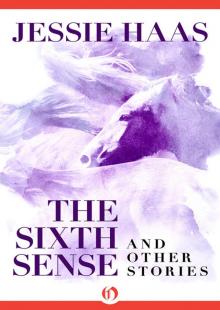 The Sixth Sense
The Sixth Sense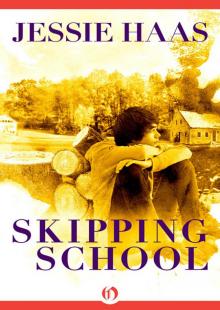 Skipping School
Skipping School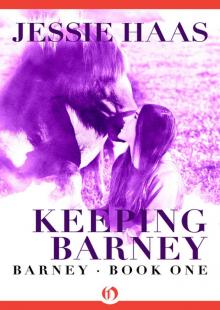 Keeping Barney
Keeping Barney Unbroken
Unbroken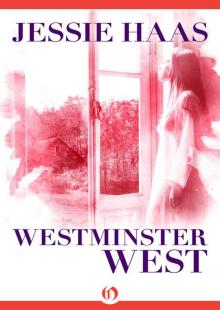 Westminster West
Westminster West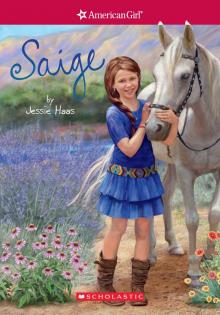 Saige
Saige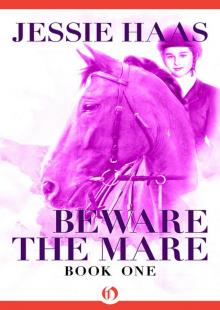 Beware the Mare
Beware the Mare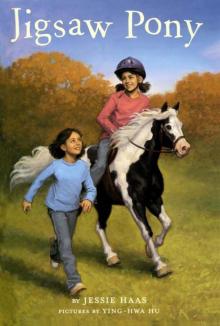 Jigsaw Pony
Jigsaw Pony Rescue
Rescue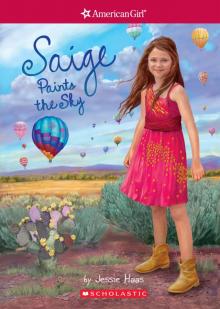 Saige Paints the Sky
Saige Paints the Sky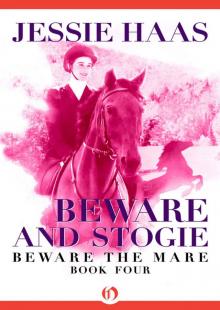 Beware and Stogie
Beware and Stogie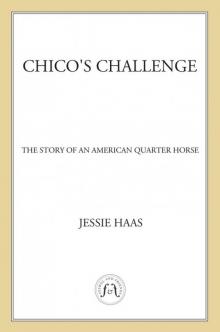 Chico's Challenge
Chico's Challenge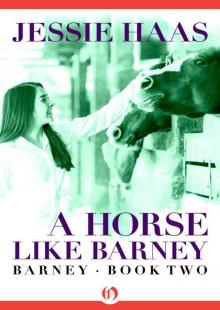 A Horse like Barney
A Horse like Barney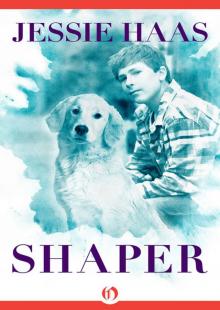 Shaper
Shaper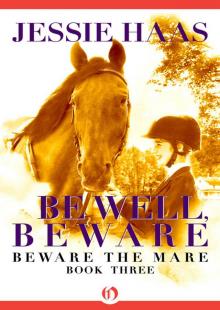 Be Well, Beware
Be Well, Beware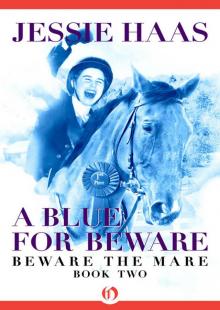 A Blue for Beware
A Blue for Beware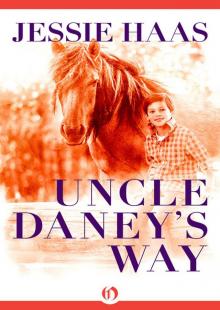 Uncle Daney's Way
Uncle Daney's Way